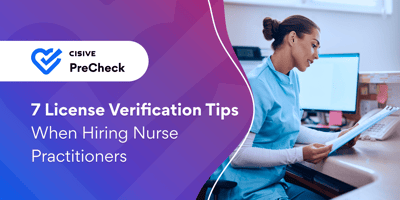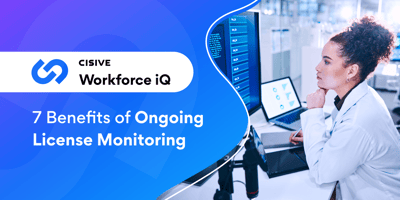.png)

Many healthcare organizations still treat nurse practitioner license verification as a routine...
.png)
In the United States, most clinicians must be licensed in each state in which they intend to practice and serve patients. This can limit the availability of health services, contribute to provider shortages, and restrict job opportunities for providers. It can also be a financial burden for nurses, due to the fees associated with licensing.
However, regulatory changes like the Nurse Licensure Compact (NLC) could increase flexibility for workplaces while keeping patient safety a priority. If your health care organization is planning to hire clinicians with a multi-state license under the NLC, here’s what you should know.
The NLC allows a nurse to obtain one license to practice in any participating state. This can reduce costs and empower nurses across the nation.
State boards of nursing developed and adopted NLC in 2015. So far, 39 U.S. jurisdictions, including states and territories, have enacted the NLC. However, not all jurisdictions have fully implemented NLC. Some have partial implementation, or have NLC legislation pending.
By allowing nurses to practice in multiple states with one license, the NLC opens up more work opportunities for these providers. Travel nurses can use the same license in multiple locations. Nurses who provide services via telehealth can serve patients in other states without having to acquire many different licenses. This helps reduce the costs of licensure.
The NLC can reduce barriers to nursing, which may help alleviate provider shortages and hiring difficulties. It also makes it easier for nurses to cross state borders and provide health services in a disaster or other emergency.
To be eligible to apply for a multi-state nursing license, a nurse must meet certain criteria, including:
Nurses who work under a multi-state license also must be prepared to be held to the standards of all states in which they practice.
Healthcare employers in NLC states should be aware of how it may impact their hiring and management practices. The NLC is still relatively new, and its rules and legislative status may be in flux in various areas. Be sure to follow changes and stay up-to-date on your state’s NLC status.
Verifying a nurse’s NLC status requires a little more than just confirming with your state’s board of nursing. First, employers should ensure that a nurse’s license is unrestricted in his or her home state. Then, check that the nurse’s license does include multi-state privileges, if you are looking to hire a nurse who is not a primary resident of your state.
Fortunately for HR departments, there is no extra paperwork required when hiring a nurse with a multi-state license. The state board of nursing does not need to be notified if a nurse under NLC is working under a privilege to practice (PTP) status.
If a nursing job candidate already has a valid NLC license, employers may not require the candidate to apply for an additional license specific to the employer’s state. In fact, disciplining or discharging a nurse for not having a state-specific license, when the nurse has a valid license under the NLC, could be unlawful.
For example, a nurse who resides primarily in Texas, a NLC state, may first obtain a license with the Texas Board of Nursing, and then a multi-state license under the NLC. If that nurse applies for a remote nursing job in Indiana, another NLC state, that employer cannot require the nurse to also obtain a license specific to Indiana if the nurse remains a Texas resident.
Clinicians who work under the NLC are also subject to the rules of all jurisdictions within the NLC. Employers and HR departments should be aware that if an employee with a NLC license is involved in an incident in another state that requires disciplinary action, it could affect that employee’s practice and availability.
Under a multi-state license, a nurse who commits any violations must answer to the location of the offense, as well as all states where the nurse has a license or PTP. This ensures that patient health and safety are not at risk under the NLC.
Because of this, potential employers should verify all NLC licenses, first before hiring the nurse and then periodically afterward. Check whether a job candidate is involved in a disciplinary action in another state that participates in the NLC.
Background checks can help identify red flags during the hiring process, and let your HR department know if a candidate has been involved in disciplinary action. PreCheck offers a variety of background checking options, including continuous background screening, to ensure that you are hiring the best nursing candidates for your organization. Speak to an expert today to learn more.
Author: Jenni Gallaway
Bio: Content Marketing Manager at Cisive. 8 years of experience in the background screening industry.
Let's Connect on LinkedIn
Many healthcare organizations still treat nurse practitioner license verification as a routine...
.png?height=200&name=Nursing-Diploma-Scheme-Follow-up-(PreCheck).png)
In January 2023, The Department of Justice U.S. Attorney’s Office of the Southern District of...

In healthcare, patient safety and regulatory compliance often hinge on one essential task: making...